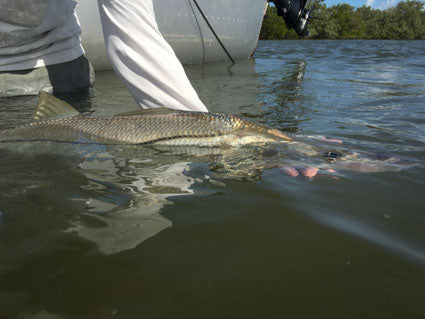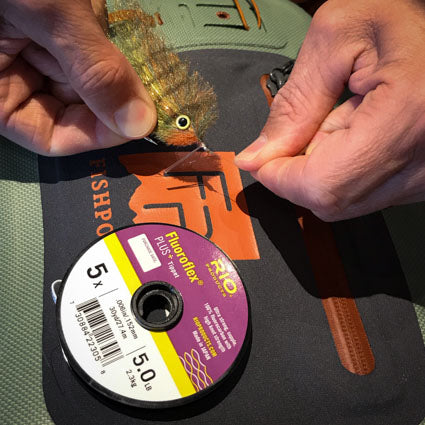I have several friends who are firefighters. They have done some pretty amazing things, including prying apart upside down vehicles to rescue the passengers and pulling people out of burning buildings. What they don’t do is start fires. Their job is to deal with emergencies as they occur.
 We have all heard stories about an enormous fish caught on a very light rod or leader. The best of these “Old Man and the Sea” style epic battles start with an angler unexpectedly hooking a fish they are wholly unprepared for. A tarpon shows up on a bonefish flat, eats a well presented bonefish fly and is miraculously hooked in the perfect spot where it can’t wear through the 12 pound tippet. Or a 40” snook slides out from under the mangroves to eat a fly intended for a much smaller fish. Or maybe it’s a 10 pound Florida largemouth bass that sucks down a tiny panfish popper. Sometimes the fish is landed, but just as often the angler is left in silence, with a frayed tippet and a pounding heart. Moments like these, often retold and discussed for years to come, are one of the things that make the early mornings and fishless days completely worthwhile.
We have all heard stories about an enormous fish caught on a very light rod or leader. The best of these “Old Man and the Sea” style epic battles start with an angler unexpectedly hooking a fish they are wholly unprepared for. A tarpon shows up on a bonefish flat, eats a well presented bonefish fly and is miraculously hooked in the perfect spot where it can’t wear through the 12 pound tippet. Or a 40” snook slides out from under the mangroves to eat a fly intended for a much smaller fish. Or maybe it’s a 10 pound Florida largemouth bass that sucks down a tiny panfish popper. Sometimes the fish is landed, but just as often the angler is left in silence, with a frayed tippet and a pounding heart. Moments like these, often retold and discussed for years to come, are one of the things that make the early mornings and fishless days completely worthwhile.
I have never encountered a fish that I considered too big to cast at, regardless of the rod in my hand. I have, however, thrown flies at several fish I knew I could never land, including a bluefin tuna chasing full grown false albacore along a beach in North Carolina and a pair of wahoo devouring a dorado out of Ponce Inlet in Florida. I’ve also fought and landed some big fish on tackle lighter than I would have chosen, including a big female snook pushing 40 inches that ate a #6 fly cast with a 6 weight rod.
 Catching large fish on light tackle is certainly possible and can be done humanely. When targeting a fish generally considered to be on the large size for the tackle you are using, it is important to understand the environmental conditions and how they impact the fish. While you might be able to catch and safely release a 30” redfish on a 6 weight during a Florida winter, catching that same fish on a sweltering summer day off of a flat the temperature of bath water would likely kill it. Light tackle anglers need to be skillful in fighting fish and know how far their equipment can be pushed. This skill and thorough understanding of their equipment is what allows a good tarpon angler to bring large tarpon to the boat in a matter of minutes. It is also what allows them to make a good decision as to when it’s time to break a fish off.
Catching large fish on light tackle is certainly possible and can be done humanely. When targeting a fish generally considered to be on the large size for the tackle you are using, it is important to understand the environmental conditions and how they impact the fish. While you might be able to catch and safely release a 30” redfish on a 6 weight during a Florida winter, catching that same fish on a sweltering summer day off of a flat the temperature of bath water would likely kill it. Light tackle anglers need to be skillful in fighting fish and know how far their equipment can be pushed. This skill and thorough understanding of their equipment is what allows a good tarpon angler to bring large tarpon to the boat in a matter of minutes. It is also what allows them to make a good decision as to when it’s time to break a fish off.
The fish we chase are a resource that should be respected and cared for. There is nothing wrong with taking home a fish for dinner. It is, however, inexcusable to play a fish to within an inch of its life then expect it to swim away.

If your tackle and skill level are inadequate to bring a fish to hand in good enough shape that it can swim away healthy, then you need to be using heavier gear (see our post on "Leverage" for information on applying maximum pressure). To do otherwise is irresponsible. It is equally irresponsible, if not more so, to influence another angler to use tackle that is too light for them. If you hook up to a fish you really can’t handle, at the point that you realize that landing the fish will likely lead to its unintended death you need to consider whether it is time to break the fish off.
I am not a record chaser but I do understand that securing a record could require catching a fish with tackle that may be lighter than ideal. If you choose to pursue records with light tippet please make sure your skills are up to the task and be aware of the toll the battle may take on your catch.
Far too many people target fish too large for their tackle and skills, bragging about the heroic battle, and showing pictures of oxygen deprived, nearly dead fish. They are, in effect, manufacturing an “emergency.” In one sense this is not so different from a firefighter setting fire to a house so he or she can rescue the occupants from a burning building. Enjoy the “emergencies” when they happen. They are an integral part of the sport of fly fishing. But please don’t set out to create them.















Comments